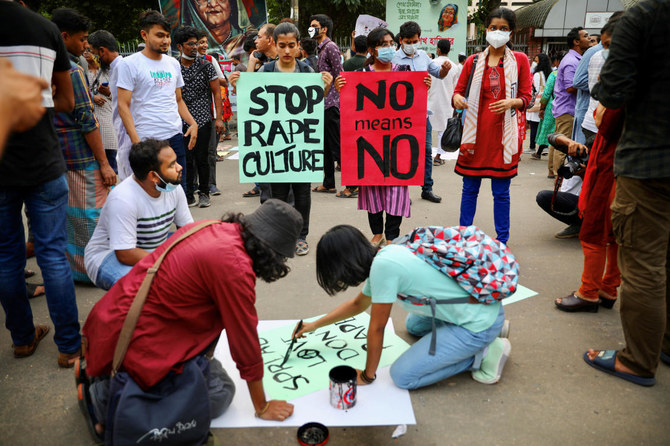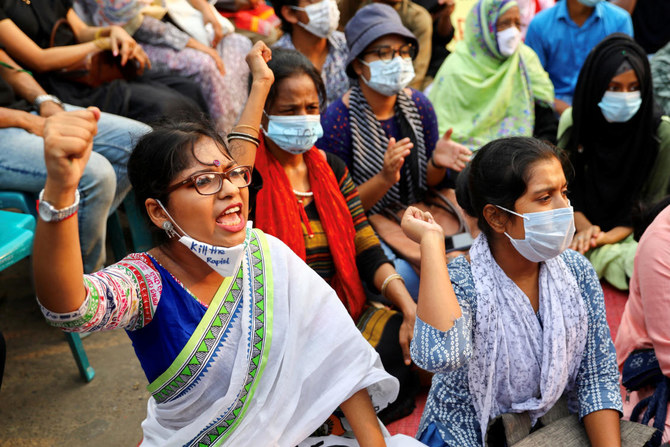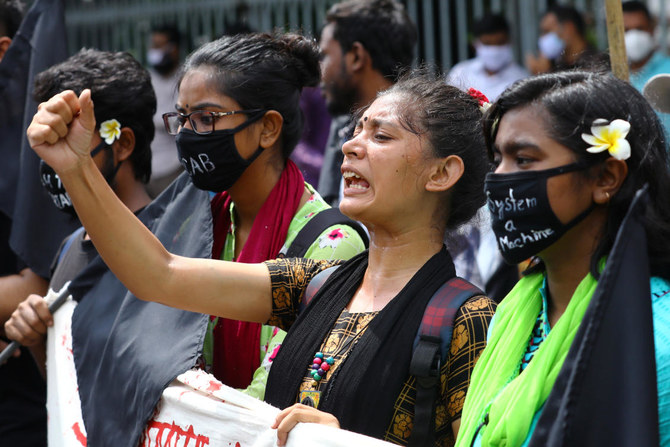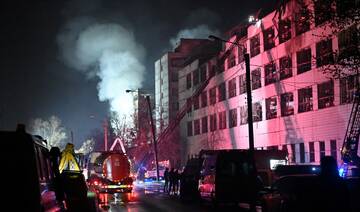DHAKA: There were protests in Bangladesh on Wednesday against recent incidents of rape and sexual violence, with some demonstrators demanding that the prime minister introduce the death penalty for convicted rapists.
According to data from the human rights group Ain O Salish Kendro, 975 women were raped between January and September this year, with 208 of those subjected to gang rape. Forty-five women were killed after being assaulted, while 12 were reported to have killed themselves.
“It's happening due to the existing system of lawlessness in society,” Asmani Asha, a spokesperson for the civil society group Bangladesh Against Rape (BAR), told Arab News. “The whole system in the country needs an overhaul to ensure a safe environment for women.”
The protests followed two gang-rapes in the country’s Noakhali and Sylhet districts.
In the first case, which took place on Sept. 2, the victim was attacked at her home. The perpetrators filmed the assault and shared it on social media. There have been six arrests in Noakhali so far.
On Sept. 25, a woman who was with her husband at a college campus in Sylhet city was abducted and gang raped in a dormitory. Police have arrested six people, who are reported to be student leaders in the ruling Awami League (AL) party headed by Prime Minister Sheikh Hasina.
“The ruling party’s activists were found accused in connection with rape incidents, and many cases didn't come under the purview of legal systems. Our prime minister is a woman too. So we expect a bold initiative from her to protect the women of the country," Asha added, demanding the death sentence for the perpetrators. “Our protests will continue until the demands are met."
There is no provision for the death penalty for sex-related crimes in Bangladesh, and individuals are sentenced to life imprisonment if convicted.
The government has pledged to bring all perpetrators to justice “irrespective of their political and social affiliations.”
Officials on Wednesday expressed their solidarity with the victims.
“I am very saddened over the recent rape and violence incidents in the country … I express my solidarity with the protesters and personally believe that the culprits should be awarded capital punishment," Fazilatun Nessa Indira, minister for women and children affairs, told Arab News. She urged Bangladeshis to “boycott” the rapists.
“A pervert mindset instigates people in such heinous misdeeds. Our law enforcement agencies are working relentlessly to prevent the miscreants. Our parents should be more caring to teach children about morality and they should be more vigilant about their children's movement and activities.”
AL general secretary and government minister Obaidul Quader urged people to be patient and to inform authorities about any incidents of violence against women.
“I will tell everyone to be patient, no need to protest,” he told a party meeting on Tuesday. “The government is not releasing anyone involved. That is why the government is bringing the perpetrators to justice to solve the problem.”
But rights groups are pushing for the Women and Children Repression Act to be revised and for authorities to make necessary amendments so that perpetrators cannot exploit loopholes to evade justice.
“We need to see the whole situation from a holistic approach,” rights activist Khushi Kabir told Arab News. “The authorities in charge should keep in mind that their duty is to serve the state, not any political party.”
She said that the government alone could not stop violence against women, and that authorities should call for social unity to make people aware of crimes against women.
Sheikh Hafizur Rahman Karzon, a law professor at Dhaka University, said there needed to be a change in the existing trial process for rape cases.
“In some cases, the laws are not women-friendly,” he added. “The victims have to face another round of embarrassment during the trials.”
Loopholes in the legal process meant that 3 percent of rape cases tried in court resulted in convictions.
“If we don't change the procedures, we can't ensure justice for the victims.”






























